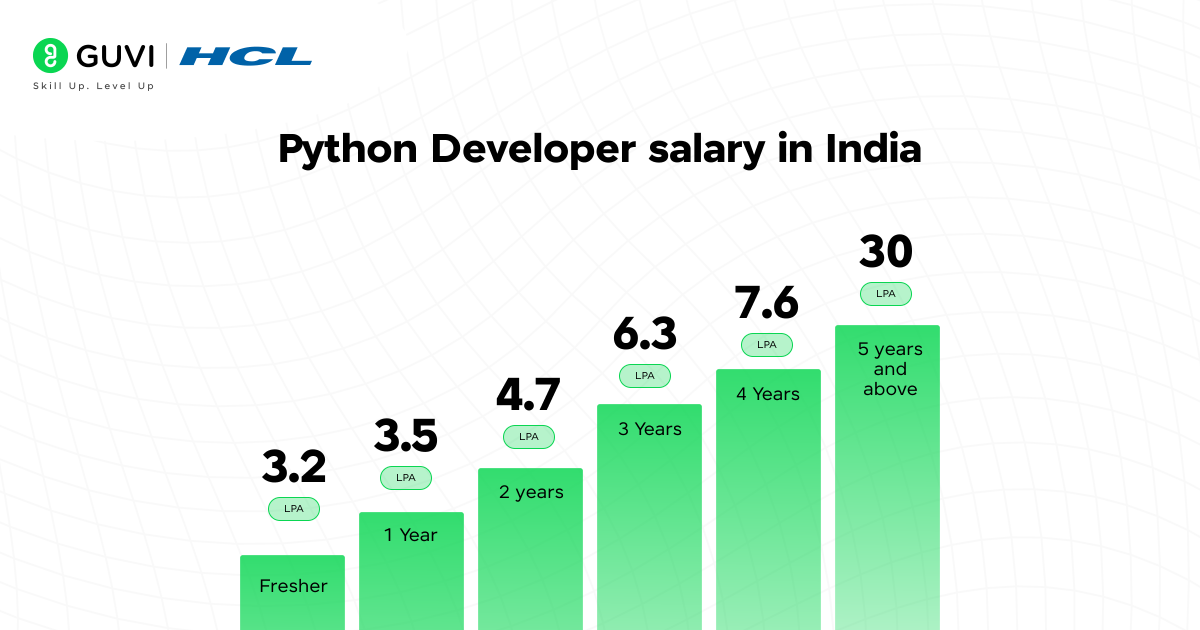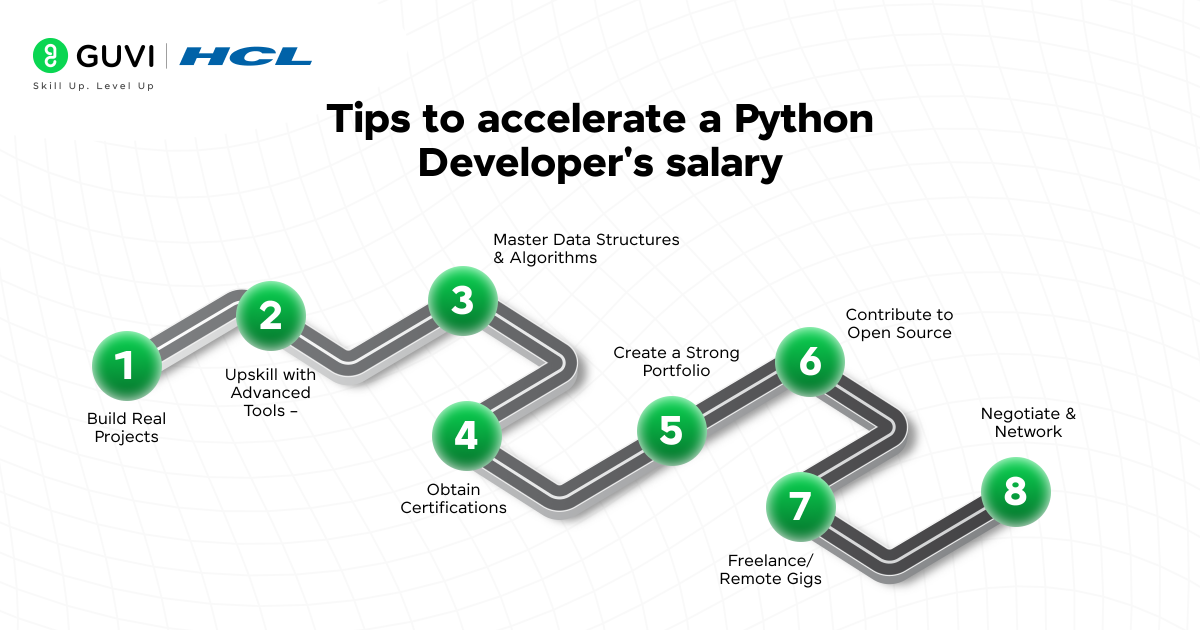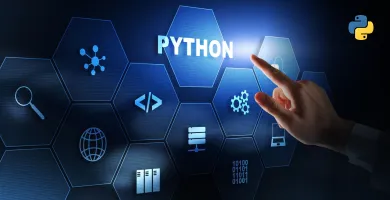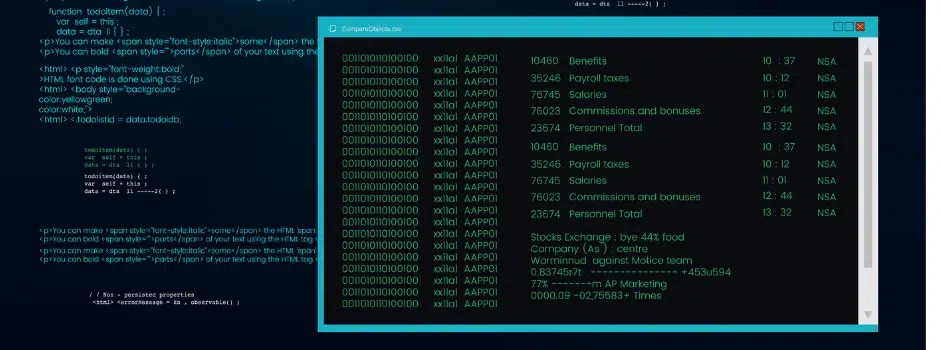
Are you stuck in a career that doesn’t excite you, or confused about which tech path to choose? Wondering if Python development could be your ticket to a high-paying, future-proof job? You’re not alone. With the rapid rise of automation, AI, and web applications, Python has emerged as one of the most in-demand and beginner-friendly programming languages in the world.
From data science and backend development to AI and automation, Python is at the heart of it all, and yes, the salaries are just as impressive as the demand. Let’s dive into what makes Python a smart career move in 2025 and how much you can earn, possibly a complete Python developer salary guide.
Table of contents
- Why Python Developers Are in High Demand
- Factors That Influence Python Developer Salary
- Experience Level
- Domain Specialization
- Company Type
- Location
- Skill Set
- Project Portfolio
- Certifications
- Python Developer Salary in India
- Entry-Level Python Developer (0–2 Years)
- Mid-Level Python Developer (2–5 Years)
- Senior Python Developer (5+ Years)
- Remote vs. In-House Python Roles
- Who Should Consider Becoming a Python Developer?
- Working Professionals
- Students & Freshers
- Tips to Boost Your Python Career & Salary
- Work on Real Projects
- Upskill Regularly
- Contribute to Open Source
- Join Developer Communities
- Prepare for Interviews
- Explore High-Demand Niches
- Get Certified
- Wrapping Up
- Frequently Asked Questions
- How long does it take to become job-ready in Python?
- What type of companies hire Python developers?
- Can I become a Python developer without a computer science degree?
- What is the average salary of a Python developer in India?
Why Python Developers Are in High Demand
Python isn’t just a programming language, it’s the engine powering today’s most transformative technologies. Its versatility makes it a go-to choice for a wide range of applications, including web development, data science, automation, and artificial intelligence. Its beginner-friendly syntax sets Python apart, making it an excellent option for those transitioning from non-tech roles or starting in the tech world.
Major companies like Google, Netflix, and Instagram have built critical systems using Python, further fueling demand for skilled developers. Add to this a rapidly expanding ecosystem of frameworks and libraries, such as Django, Flask, Pandas, and TensorFlow, and it’s clear why Python is foundational to innovation across industries.
Factors That Influence Python Developer Salary
Wondering why two Python developers with the same title earn vastly different paychecks? That’s because a developer’s salary isn’t determined by coding alone. It’s influenced by several crucial factors, ranging from experience and specialization to the type of projects handled and even the city they work in. Let’s break down the key elements that can significantly impact how much you earn as a Python developer.
Experience Level
One of the most significant determinants of salary in the Python development field is experience. Junior developers with 0–2 years of experience typically start with entry-level roles focused on debugging and writing simple modules.
However, as you gain experience, your responsibilities evolve from developing complex applications to designing system architecture and leading development teams. Naturally, senior developers with 5+ years under their belt earn considerably more due to their technical depth, leadership capabilities, and strategic thinking.
Domain Specialization
Not all Python roles are created equal. Developers specializing in high-demand domains like data science, machine learning, or artificial intelligence often command higher salaries compared to those working in basic scripting or simple web development.
This is because specialized roles require advanced knowledge of libraries such as NumPy, Pandas, TensorFlow, or PyTorch, skills that are harder to master and therefore more valuable in the market.
Read More: Learn Python: 10 Interesting Reasons to Do So!
Company Type
The kind of company you work for significantly impacts your compensation. Multinational corporations (MNCs), product-based companies, and well-funded startups tend to offer more competitive salaries along with additional perks. In contrast, small agencies or early-stage startups may provide lower pay but can offer greater learning opportunities and growth in responsibility, which can pay off in the long term.
Location
Geography plays a key role in determining how much a Python developer earns. For instance, developers based in metro cities like Bangalore, Hyderabad, or Mumbai tend to receive higher salaries due to the cost of living and the concentration of tech companies. Moreover, international remote jobs, especially those based in the US, UK, or EU, offer significantly better packages, making remote work a lucrative option for skilled developers in India.
Skill Set
Beyond just knowing Python, your proficiency in complementary tools and frameworks can greatly influence your earning potential. For backend developers, mastery of Django or Flask is essential.
Data professionals benefit from expertise in libraries like Pandas, NumPy, and scikit-learn. Knowledge of Docker, Git, REST APIs, and cloud services (like AWS or Azure) also adds tremendous value and widens your job prospects.
Project Portfolio
A strong, hands-on portfolio can sometimes speak louder than years of experience or certificates. Real-world projects such as building web applications, automating workflows, or creating data visualizations not only showcase your technical abilities but also your problem-solving and execution skills. Recruiters and employers are increasingly interested in what you’ve built, not just what you know.
Certifications
Certifications can serve as a great way to validate your knowledge, especially when you’re trying to stand out in a competitive job market. Certifications from reputable platforms like HCL GUVI can improve your credibility and help you negotiate for a better salary, particularly if you’re new to the field or switching from a non-tech background.
Python Developer Salary in India
With Python powering everything from data science and automation to AI and backend development, the demand for Python developers in India continues to surge. Here’s how salaries stack up based on experience, skillset, and work model:
Entry-Level Python Developer (0–2 Years)
Freshers or professionals transitioning into tech roles with foundational Python knowledge (and maybe one or two projects or internships) can expect an average salary of ₹4.7 LPA.
Common roles include junior Python developer, automation script writer, or Django/Flask backend associate.
Tip: Focus on building mini-projects, contributing to GitHub, and showcasing your work on a portfolio site or LinkedIn.
Mid-Level Python Developer (2–5 Years)
Developers in this bracket typically have experience with Python frameworks (like Django, Flask, or FastAPI), database integration, and may also be branching into DevOps or data analytics.
Average salaries fall between ₹7.5–8 LPA, especially for those with solid project delivery experience and cross-functional exposure.
They’re often employed in IT services, fintech startups, or product-based companies looking to scale efficiently.
Senior Python Developer (5+ Years)
Seasoned Python developers take on strategic roles like architecting systems, managing data workflows, and often leading machine learning, AI, or API-first backend platforms.
They earn an average of ₹8–15 LPA, with top-tier experts in data science or cloud-based platforms going up to ₹30+ LPA.
Many in this category move into Tech Lead, Data Engineer, or Engineering Manager roles, especially in AI-driven companies or SaaS startups.

Remote vs. In-House Python Roles
Post-pandemic, remote work has opened up a global playground for Indian Python developers.
International companies from the US, Europe, and Australia hire Indian Python devs via platforms like Toptal, Deel, Upwork, and RemoteOK.
Remote Python developers in India can earn 2x–3x more, especially in specialized areas like data science, AI, or backend infrastructure.
Read More: Python Libraries for Data Science: What Top Companies Actually Use
Who Should Consider Becoming a Python Developer?
The demand for skilled Python developers is rising rapidly, driven by Python’s widespread use in web development, data science, AI, automation, and more. Its beginner-friendly syntax and vast ecosystem make it one of the best programming languages for career growth. Here’s who stands to benefit the most from pursuing this in-demand skill set.
Working Professionals
If you’re currently in BPO, manual testing, support, or sales roles and want better pay with growth, learning Python can be a game-changer. Within 6–12 months, many career switchers land junior Python roles or internships that double their previous income in 2 years. A study says that employees who know Python earn an average of ₹25.1lakhs, mostly ranging from ₹ 17.0 lakhs to ₹ 97.2 lakhs.
Students & Freshers
For those unsure about choosing traditional fields like mechanical or civil engineering, Python offers a more future-oriented path. As industries continue to embrace digital transformation, tech domains such as artificial intelligence, machine learning, and automation are expanding rapidly, and Python sits at the core of these advancements. It’s an excellent starting point for students aiming to build a versatile and in-demand career in IT.
Tips to Boost Your Python Career & Salary
Follow these actionable steps to fast-track your growth and unlock higher-paying roles.
Work on Real Projects
Hands-on experience is your best asset. Start by building small automation scripts to solve everyday problems. Progress to creating web applications using Django or Flask. Projects not only enhance your skills but also act as proof of work for hiring managers when showcased on GitHub or your portfolio website.
Upskill Regularly
Python’s ecosystem is vast and ever-evolving. Stay updated with trending libraries and frameworks. For backend development, focus on Django and Flask. If you’re into data science or AI, mastering libraries like NumPy, Pandas, Scikit-learn, and TensorFlow is crucial. Make time for learning new tools and exploring how Python integrates with emerging tech.
Contribute to Open Source
Contributing to open-source projects can fast-track your learning. Platforms like GitHub offer thousands of Python projects looking for contributors. It helps you understand code written by professionals, learn collaboration skills, and build credibility in the developer community. Hiring managers often notice consistent contributors to meaningful repositories.
Join Developer Communities
Networking is as important as coding. Join Python communities on Reddit, GitHub, Stack Overflow, or LinkedIn. Participate in hackathons, discussions, and AMA (Ask Me Anything) sessions. These platforms can help you learn industry trends, get job referrals, and receive valuable feedback from peers and mentors.
Prepare for Interviews
Beyond technical skills, interviews test your problem-solving approach and coding efficiency. Focus on Data Structures and Algorithms (DSA), Object-Oriented Programming (OOP), and real-world problem solving. Use platforms like LeetCode, HackerRank, and CodeSignal to practice. Being interview-ready gives you a strong edge in competitive hiring rounds.
Explore High-Demand Niches
Python is used across domains, but some areas offer significantly higher salaries and growth. Data Science, Machine Learning, DevOps automation, and backend development are especially lucrative. Choose a niche aligned with your interests and start building niche-specific skills and projects.
Get Certified
Certifications add credibility, especially when you’re switching careers or applying without a degree in computer science. Certificates from reputable platforms can strengthen your profile and increase your chances of being shortlisted in interviews at top companies.
If you’re looking to master Python with a well-organized learning path, HCL GUVI’s Self-Paced Python Course, certified by IITM Pravartak, could help you! It’s designed to take you from the basics to writing programs that can collect, clean, analyze, and visualize data effectively.

Wrapping Up
Python continues to dominate the tech landscape, offering one of the most versatile and beginner-friendly entry points into high-paying tech careers. It’s a career-launcher, a growth driver, and a ticket to global opportunities, especially in today’s world where companies are embracing automation, AI, and data like never before.
With the right roadmap, hands-on learning, and mastering in-demand tools, you could be earning a solid salary, contributing to exciting projects, and future-proofing your tech career. So why wait? Pick up Python today, and start shaping a career that pays well, challenges you creatively, and keeps you at the forefront of innovation.
Frequently Asked Questions
How long does it take to become job-ready in Python?
With consistent learning and projects, you can master Python in 6–8 months.
What type of companies hire Python developers?
Startups, MNCs, Fintech, EdTech, AI/ML firms, and remote tech companies worldwide hire Python developers.
Can I become a Python developer without a computer science degree?
Yes! Many professionals from non-tech backgrounds have successfully transitioned through bootcamps and self-learning.
What is the average salary of a Python developer in India?
The average salary of a Python developer in India is ₹6 LPA and can go up to ₹15+ LPA with experience and specialization.


























Did you enjoy this article?